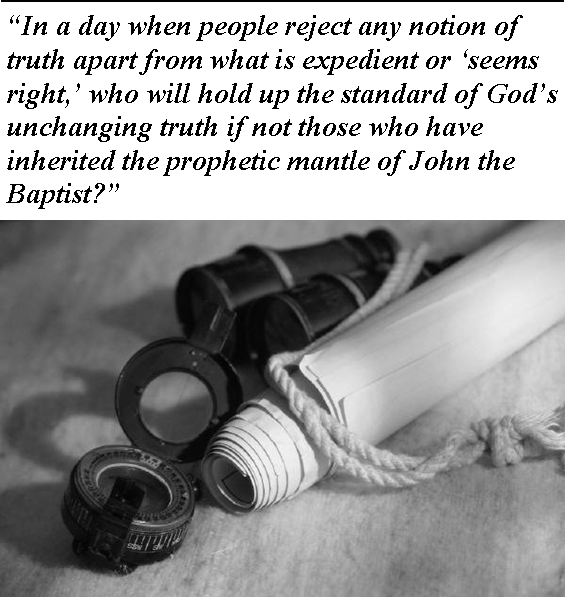| April 6, 2005 |
no comments

The church collectively is the prophetic people of God.
But what significance does that hold for us today? How does the prophetic spirit translate into action when lived out in the world? In answering these questions, my attention was drawn to a most intriguing figure in the New Testament—John the Baptist. The choice of focus might seem odd given that John was technically an Old Testament prophet: “For all the prophets and the Law prophesied until John” (Mt. 11:13). Nevertheless, the focus is justified by some remarkable statements made about him by Jesus. For example, of those born of women, Jesus said, “there is no one greater than John” (Lk 7:28).
3 Part of his greatness stems from the fact that his prophetic ministry was in a real sense unique. By Jesus’ own words he was “more than a prophet.” He was chosen as God’s herald, a forerunner to the Messiah who would prepare for his coming (Lk. 7:26). In view of this appraisal what can we learn about the prophetic Spirit from
the consummate Old Testament prophet—John the Baptist? In chapter 3 of Luke’s Gospel we are given a fascinating portrait which depicts three aspects of his prophetic ministry: 1) scope; 2) the content and 3) the courage of prophetic preaching.
The Scope of Prophetic Preaching
We can be sure that the Jewish religious establishment heard John’s preaching.
In this chapter we are quickly introduced to a series of groups who heard John’s prophetic preaching. We are told that the word of God came to John during the high priesthood of Annas and Caiphas (v.3).
4 If they did not personally hear John’s preaching, they most certainly heard it second-hand from the Pharisees and Sadducees, who were at the Jordan River while John was baptizing (Mt. 3:7). Thus, we can be sure that the Jewish religious establishment heard John’s preaching. In verse seven John issues a scathing rebuke to the crowds who had gathered to hear him.
5 These represent the undifferentiated masses of society at large. What follows are encounters with groups within the multitude. For example, in verse twelve we find John addressing the tax gatherers (Greek,
teleonai)—locals hired by Roman officials to collect regional taxes. They were often rich enough to pay the tax quota in advance from their own personal wealth. They then proceeded to collect well above that amount.
6 Seen as treasonous collaborators with Rome, these economic king pins kept the wheels of Roman prosperity amply greased. Next John addresses soldiers (v. 14), the most visible component of Roman military occupation sent to forcibly keep the
pax Romana in that part of the empire. Finally, we find John confronting Herod Antipas with a prophetic word of rebuke. Herod, son of Herod the Great, was tetrarch of Galilee. Although a political puppet of Rome, Herod exercised nearly unlimited political power and authority, answerable to no one except the emperor.
Page 2 of 6«12345...»Last »
Tags: baptist, featured, john, pentecost, prophetic, spirit
Category: Ministry, Spring 2005



